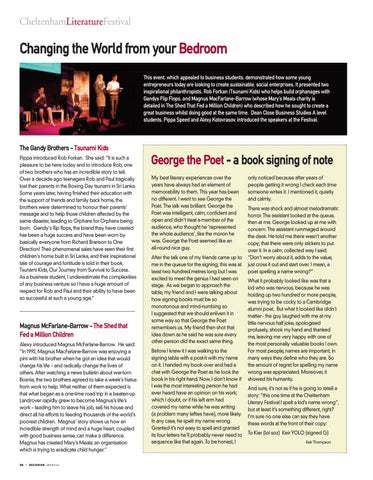DECANIAN MASTER 2016 ADAM_Layout 1 27/09/2016 18:01 Page 57
CheltenhamLiteratureFestival
This event, which appealed to business students, demonstrated how some young entrepreneurs today are looking to create sustainable, social enterprises. It presented two inspirational philanthropists, Rob Forkan (Tsunami Kids) who helps build orphanages with Gandys Flip Flops, and Magnus MacFarlane-Barrow (whose Mary’s Meals charity is detailed in The Shed That Fed a Million Children) who described how he sought to create a great business whilst doing good at the same time. Dean Close Business Studies A level students, Pippa Speed and Alexy Kotovrasov, introduced the speakers at the Festival.
Pippa introduced Rob Forkan. She said: “It is such a pleasure to be here today and to introduce Rob, one of two brothers who has an incredible story to tell. Over a decade ago teenagers Rob and Paul tragically lost their parents in the Boxing Day tsunami in Sri Lanka. Some years later, having finished their education with the support of friends and family back home, the brothers were determined to honour their parents' message and to help those children affected by the same disaster, leading to Orphans for Orphans being born. Gandy's flip flops, the brand they have created has been a huge success and have been worn by basically everyone from Richard Branson to One Direction! Their phenomenal sales have seen their first children's home built in Sri Lanka, and their inspirational tale of courage and fortitude is told in their book, Tsunami Kids, Our Journey from Survival to Success. As a business student, I underestimate the complexities of any business venture so I have a huge amount of respect for Rob and Paul and their ability to have been so successful at such a young age.”
Alexy introduced Magnus McFarlane-Barrow. He said: “In 1992, Magnus MacFarlane-Barrow was enjoying a pint with his brother when he got an idea that would change his life – and radically change the lives of others. After watching a news bulletin about war-torn Bosnia, the two brothers agreed to take a week’s hiatus from work to help. What neither of them expected is that what began as a one-time road trip in a beaten-up Landrover rapidly grew to become Magnus’s life’s work – leading him to leave his job, sell his house and direct all his efforts to feeding thousands of the world’s poorest children. Magnus’ story shows us how an incredible strength of mind and a huge heart, coupled with good business sense, can make a difference. Magnus has created Mary’s Meals; an organisation which is trying to eradicate child hunger.” 58 ~ DECANIAN 2015/16
My best literary experiences over the years have always had an element of memorability to them. This year has been no different. I went to see George the Poet. The talk was brilliant. George the Poet was intelligent, calm, confident and open and didn’t treat a member of the audience, who thought he ‘represented the whole audience’, like the moron he was. George the Poet seemed like an all-round nice guy. After the talk one of my friends came up to me in the queue for the signing; this was at least two hundred metres long but I was excited to meet the genius I had seen on stage. As we began to approach the table, my friend and I were talking about how signing books must be so monotonous and mind-numbing so I suggested that we should enliven it in some way so that George the Poet remembers us. My friend then shot that idea down as he said he was sure every other person did the exact same thing. Before I knew it I was walking to the signing table with a post-it with my name on it. I handed my book over and had a chat with George the Poet as he took the book in his right hand. Now, I don’t know if I was the most interesting person he had ever heard have an opinion on his work; which I doubt, or if his left arm had covered my name while he was writing (a problem many lefties have), more likely. In any case, he spelt my name wrong. Granted it’s not easy to spell and granted its four letters he’ll probably never need to sequence like that again. To be honest, I
only noticed because after years of people getting it wrong I check each time someone writes it. I mentioned it, quietly and calmly. There was shock and almost melodramatic horror. The assistant looked at the queue, then at me. George looked up at me with concern. The assistant rummaged around the desk. He told me there wasn’t another copy; that there were only stickers to put over it. In a calm, collected way I said: “Don’t worry about it, adds to the value, just cross it out and start over. I mean, a poet spelling a name wrong?” What it probably looked like was that a kid who was nervous, because he was holding up two hundred or more people, was trying to be cocky to a Cambridge alumni poet. But what it looked like didn’t matter - the guy laughed with me at my little nervous half joke, apologised profusely, shook my hand and thanked me, leaving me very happy with one of the most personally valuable books I own. For most people, names are important; in many ways they define who they are. So the amount of regret for spelling my name wrong was appreciated. Moreover, it showed his humanity. And sure, it’s not as if he is going to retell a story: “this one time at the Cheltenham Literary Festival I spelt a kid’s name wrong”, but at least it’s something different, right? I’m sure no one else can say they have these words at the front of their copy: To Kier (lol soz) Keir YOLO (signed G) Keir Thompson
